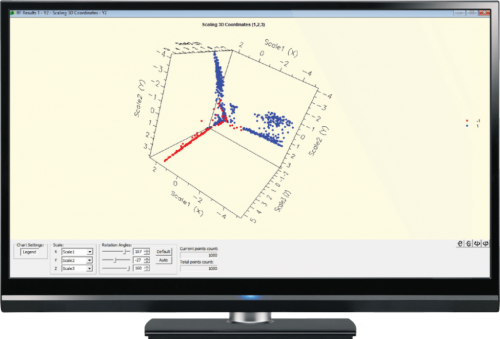Random Forests
Introduction
Random Forests (RF) is one of the most important tools used in modern Data Mining, Machine Learning and Predictive Analytics. It can be used for both Classification and Regression problems. Random Forests is a collection of many CART decision trees that are not influenced by each other when constructed. The sum of the predictions made from decision trees determines the overall prediction of the forest. It can handle large numbers of variables in a dataset. It can be used to generate accurate and reliable predictive models for a wide range of applications in all types of industry verticals. Random Forests strengths are spotting outliers and anomalies in data, displaying proximity clusters, predicting future outcomes, identifying important predictors, discovering data patterns, replacing missing values with imputations, and providing insightful graphics. It also offers a high level of accuracy. One of the main advantages is that it reduces the risk of overfitting and the required training time. Random Forests models strive to reduce the generalization error of the decision tree model.
What is Random Forest?
The random forest is a supervised learning algorithm and the main idea is to fit multiple CART decision trees to independent bootstrap samples of the data. Random forests algorithm, which represents a substantial advance in data mining, is based on novel ways of combining information from a number of decision trees. Available for both classification and regression problems. Here, instead of relying on one CART tree, the random forest takes the prediction from each CART tree and based on the majority votes of predictions, and it predicts the final output.
Random Forests Strengths
- Automatic variable selection.
- Automatic modelling of local effects.
- Invariant to monotone transformations of predictors.
- Automatic missing value & outlier handling.
- Automatic variable interaction & nonlinear relationship detection.
Random Forests in Salford Predictive Modeler
Salford Predictive Modeler is an integrated suite of Machine learning and Predictive Analytics Software. It includes various data mining techniques like classification, clustering, association and prediction. Some of the other methods are regression, survival analysis, missing value analysis, data binning and many more. SPM is a highly accurate and ultra-fast platform for developing predictive, descriptive, and analytical models from databases and datasets of any size, complexity, or organisation. The Salford Predictive Modeler software suite includes CART, MARS, TreeNet, Random Forests, as well as powerful new automation and modelling capabilities not found elsewhere.
Random Forests are also known as RF or Random Forest, and all these terms are trademarks of the creators of Random Forests technology, Leo Breiman and Adele Cutler, and licenced exclusively to Minitab’s Salford Predictive Modeler. No other combination of decision trees may be described as a Random Forest either scientifically or legally. The only commercial version of Random Forests software is distributed by Minitab. It includes a number of proprietary features, extensions, and enhancements developed by Salford Systems, Leo Breiman and Adele Cutler which are exclusive to Salford Predictive Modeler software.

Random Forests in Salford Predictive Modeler
Why use Random Forests?
- Can be used for both Classification and Regression problems.
- Random forest will ultimately identify the best predictors automatically.
- Capable of handling large datasets and missing values.
- Trees are grown at high speed because few variables are in use at any one time.
- It offers novel graphical displays that can yield new insights into data.
- Reduces the risk of overfitting and enhances the accuracy of the model.
- Random forest has less variance than a single decision tree.
We conduct various training programs – Statistical Training and Minitab Software Training. Some of the Statistical training certified courses are Predictive Analytics Masterclass, Essential Statistics For Business Analytics, SPC Masterclass, DOE Masterclass, etc. (Basic to Advanced Level). Some of the Minitab software training certified courses are Minitab Essentials, Statistical Tools for Pharmaceuticals, Statistical Quality Analysis & Factorial Designs, etc. (Basic to Advanced Level).
We also provide a wide range of Analytics Solutions like Business Analytics, Digital Process Automation, Enterprise Information Management, Enterprise Decisions Management and Business Consulting Services for Organisations to enhance their decision support systems.
